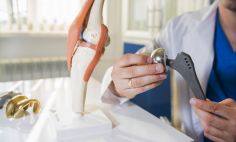Health Topics

Keys to recovery after knee replacement surgery
Patient shares her knee pain journey
Melanie Modlin, 62, had total knee replacement last June. Her number one question after surgery was, "When am I going to feel normal again?" The answer came slowly.
For Melanie, feeling normal involved more than just becoming pain-free. She focused on rebuilding her range of motion and her strength.
"With knee surgery and replacement, it's important to get moving right away or else scar tissue can settle around that new joint," says Melanie. "If that happens, you can lose range of motion very quickly."
Exercise was key to getting better. Melanie did all the exercises her doctor and physical therapists recommended. A positive mental attitude helped, too, she says.
During her recovery, Melanie focused on "little victories." The first little victory was standing from a chair without using her arms. Another was walking with a cane instead of crutches. Later victories included walking without a cane and finally going up and down the stairs.
After four months, she felt much better. After six months, she felt fantastic. "But I know it's different for everyone," Melanie says.
The first time Melanie dislocated her kneecap, she was in eighth grade. As an adult, she experienced that same feeling a few more times. When she was 49 years old, she learned that she had osteoarthritis in her knee. Osteoarthritis causes pain, swelling, and reduced motion.
She could manage the pain on her own until one day in 2015.
On her way to work, carrying a heavy briefcase and purse, Melanie felt her right knee give way on the stairs near the parking lot. She couldn't get up. Luckily, she could call for help at NIH's National Library of Medicine, where she works.
Melanie had torn the cartilage in her knee and would need total knee replacement surgery, her doctor said.
Knowing that joint replacements last about 15 to 20 years, Melanie did everything she could to manage pain and keep active until her surgery. She did physical therapy, used crutches when necessary, and got regular cortisone shots.
But in the spring of 2017, she couldn't wait any longer. Her knee joint was bone-on-bone, meaning the cartilage had worn away, and she was in terrible pain. She needed surgery.
More than eight months after surgery, Melanie says she feels fortunate. In addition to celebrating "little victories" along the way to recovery, she also found what she calls "great gifts."
"I always thought of myself as a patient person, but now I'm even more patient," she said. "And I'm not as afraid to ask for help. People have been kind and generous. A friend stayed with me after my surgery and coworkers helped by bringing me lunch and visiting me."
One step and one victory at a time–plus the gifts of patience and gratitude–continue to help Melanie live a better life after surgery.







